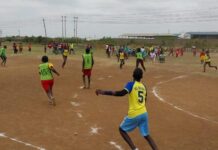
Amongst the Gusii people of Western Kenya, men were never expected to wail, let alone be seen dropping tears in whatever circumstance, including times of tragedy.
The Abagusii believed that men screamed internally and were expected to be the source of comfort to women, whose role was to scream at the top of their voices when death struck. If both screamed, then they narrowed the difference between themselves, so was it believed.
Abagusii were not alone. In most societies, women and men perform different roles during funerals and burials. Among the Gusii people the roles performed by men and women are different but complimentary.
However, in recent years, these roles and practices have changed. Mourning the dead was a solemn and sorrowful event with women pouring torrential tears.
This role has been taken by young men, particularly bodaboda riders, who seem to do it for fun.
Each passing day, one expects to find a funeral caravan from morgues to various villages in both Kisii and Nyamira regions.
Leading the caravans are bodaboda riders, who ride in neck-breaking speeds, sometimes taking deadly turns and swerving through traffic.
They do this while carrying two or three pillions whose work is to scream, hurl insults and harass onlookers and motorists alike. You would think war is boiling!
On a Thursday, this writer embarked on an assignment to find out why the young men, and their passengers seem to enjoy a sorrowful journey.
At Konate junction, about 2 km from Nyamira Town, he sat at a kiosk that gave him the best view of the road, armed with his camera to capture the dramatic funeral processions.
The junction that links Nyamira to the Kisii-Chemosit road gives a nice view of vehicles approaching from Nyamira Town, where Nyamira County Referral Hospital and Nyamira Nursing Home which offer mortuary services are located.
Mr. Silvanus Nyamora, a resident of Nyamira County says that the habit of men screaming as if they are joying death is not African. Mr. Nyamora terms the wailing of the bodaboda riders as a mockery to the dead.
“Their wailing is done jokingly. It’s a bad thing and I strongly detest it,’’ he said.
Mr. Nyamora says that according to the Abagusii tradition, those who are supposed to wail are actually those with a special attachment with the deceased.
“What these bodaboda riders do is just but ridiculing the deceased,” he argues.
It did not take long before a funeral caravan approached Konate with tens of bodaboda riders in the lead.
The riders were wailing loudly and hooting. Most of them covered themselves with some tree leaves and a stranger would mistaken the scene for a demonstration.
The bodaboda riders act as way openers and lead the processions with vehicles following them closely.
One could tell that most of the riders were under the influence of alcohol and their riding was careless. Each rider had between one and five passengers who were equally not worried of the dangerous ride.
One of the processions was headed to Iteresi village, the home of the deceased and our reporter followed it all the way.
The riders, especially the drunk ones, shouted unprintable insults to other road users. They would carelessly block other road users, endangering their lives.
In such processions, one has to carry his heart in hands because you cannot predict what will happen next, given their carelessness.
This was a procession of Mr. Ong’eta, (not his real name) an aged man from Iteresi village, Itibo Ward in North Mugirango Constituency.
The procession went through Kebirigo-Nyaramba road before maneuvering through a dusty road full of potholes to Enkinda and finally Iteresi village.
Things worsened each time the caravan got nearer home. The riders became the road marshals who made sure that the processions moved in a snail’s pace.
It took half an hour from Enkinda to Iteresi, where even walking takes one about ten minutes. The riders were wailing even more, but one could tell that they did not mean it.
Interviews revealed that many of the bodaboda riders just join the procession for fun.
Julius Mambo, a rider based in Nyaramba, says that sometimes they join the procession for fun.
‘‘Sisi huingia tu kwa msafara kwa sababu tumeona bodaboda wengine wako hapo, (we join the procession once we see other riders in it),” said Mambo.
He adds that, most of them join the procession mostly when they do not see potential travelers instead of sitting idle at their stages.
“The processions keep us busy and we hope that we may find business when we are back,” he said.
Like other bodaboda riders, Mambo says that on several occasions, he has been part of the procession even when they are not paid.
Evans Mwebi, a former bodaboda rider says that during his time, he did not wail for an unknown person whom they are not even related.
‘‘I used to get hired and carry the mourners. What I witness these days is total madness,” he adds.
Some women interviewed think it is fine for men to wail but others do not approve the behavior.
Lydia Mokeira, a middle-aged lady thinks the riders are paid by the grieving family to wail.
‘‘The riders are making a living out of it. Some hire them to wail and create emotions,’’ she says.
For Gladys Nyotera, it is not a must for mourners to be related to the departed person for him to wail.
She adds that wailing in someone comes naturally.
She adds that most of the bodaboda riders’ behavior is influenced by alcohol.
In a typical African traditional setting, death is intricately tied to life. In some traditions, death is merely a rite of passage through to another plain of existence, a transition which does not alter or end the life or change the temperament of a person, but only causes a change in its form.
This is expressed in the idea of ancestors─ individuals who have died but who continue to “live” in the community and commune with their families.
The goal of death is to become an ancestor. For this reason, individuals must be given an “accurate” burial, bounded by abundant religious formalities.











































Very good and informative story
It has become a menace during processions of death persons in our locality.
Something must be done.